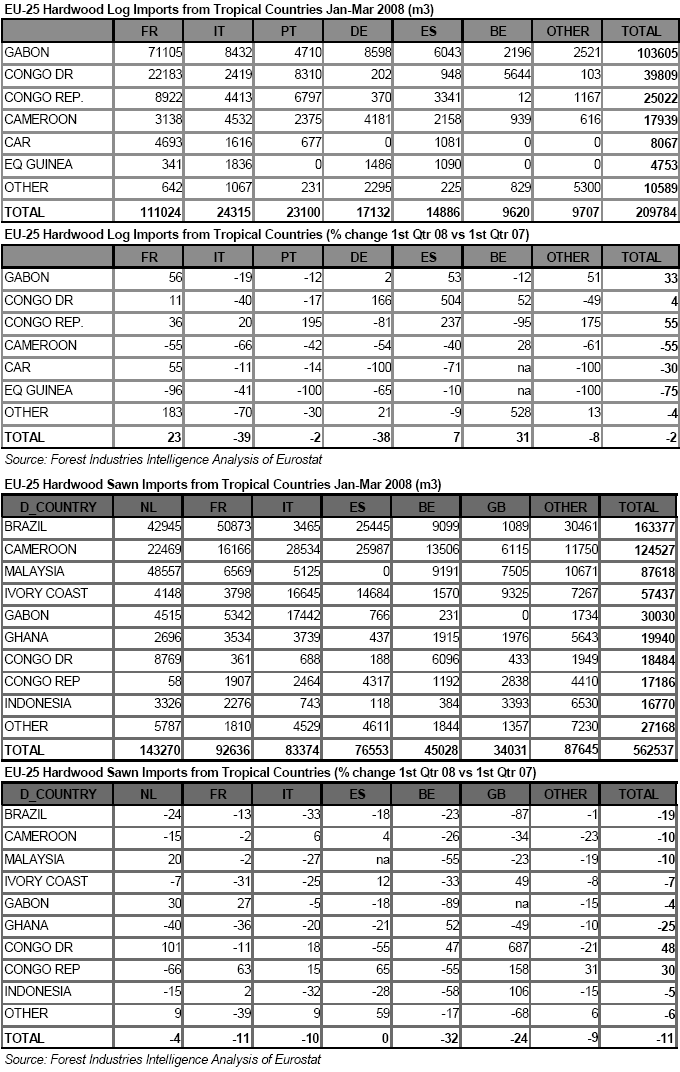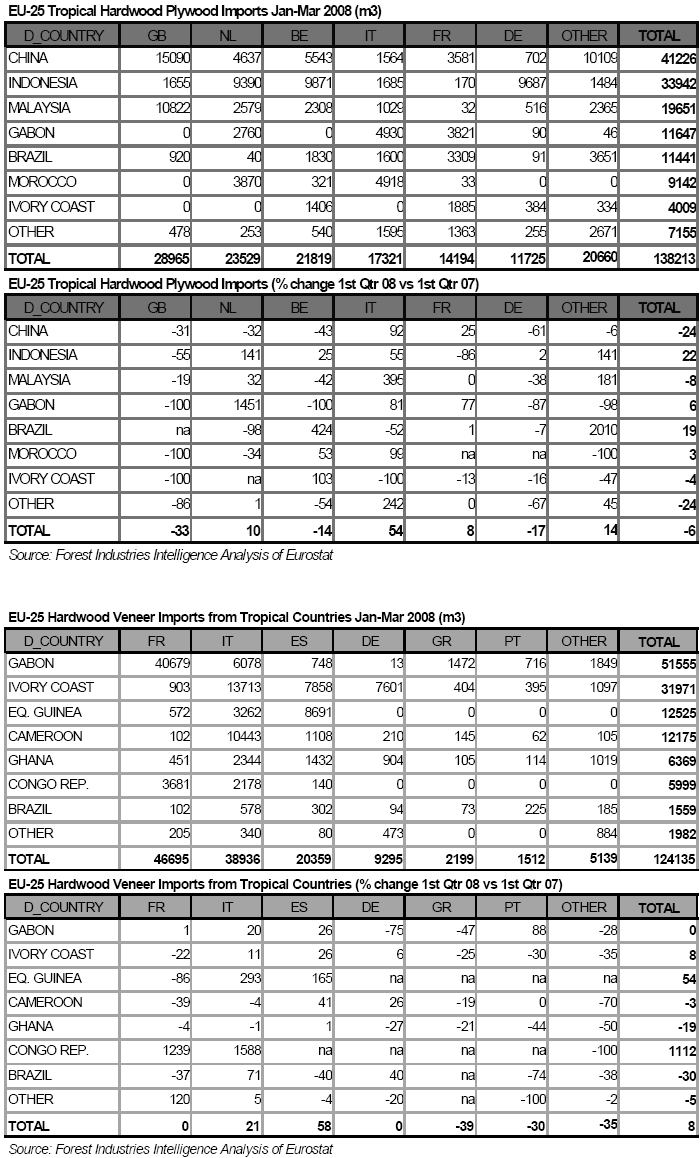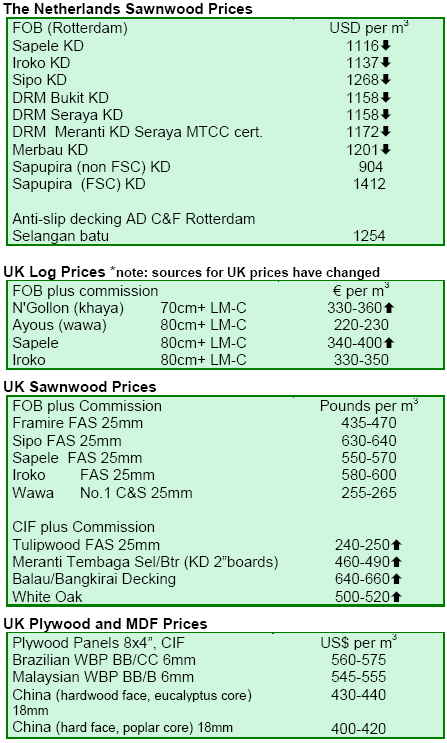|
Report
from Europe
and the UK
Statistics confirm EU trade slowdown during first half
2008
An analysis of Eurostat import data for the EU-25 group
of countries (all EU members excluding Romania and
Bulgaria) carried out by Forest Industries Intelligence
Limited tends to confirm the rather negative anecdotal
reports of trading conditions during the period January to
March 2008 (see data below). While EU-25 import
volumes of tropical hardwood logs and veneers held up
reasonably well during the review period (down 2% and
up 8% respectively), imports of tropical hardwood sawn
and plywood were significantly down on the previous year
(down 11% and 6% respectively).
There were also signs of shifts in the direction of trade.
While EU imports of tropical wood products from Brazil,
Malaysia, and Cameroon have generally declined this
year, imports from Gabon, Congo Republic and Congo
DR have generally improved. And after several years of
significant growth in the EU¡¯s tropical hardwood plywood
imports from China, there was a significant downturn in
this trade during the opening months of 2008.
Trading conditions have also varied dramatically between
EU countries. Some EU countries reported relatively
strong imports of specific tropical commodities during the
3 month review period. For example imports of tropical
logs into France and Belgium were up 23% and 31%
respectively compared to the same period in 2007, while
Italy¡¯s imports of tropical hardwood plywood were up
54%. Italy and Spain recorded 21% and 58% increases in
the volume of tropical hardwood veneer imports.
But these gains were more than off-set by dramatic falls in
trading volumes elsewhere. For example there was a
respective 39% and 38% decline in Italy¡¯s and Germany¡¯s
imports of tropical hardwood logs. Belgian and UK
imports of tropical hardwood sawnwood were down 32%
and 24% respectively. UK tropical hardwood plywood
imports were down 33%.


EU economic conditions worsen
European trading conditions for tropical hardwood
products are currently very quiet. This year the usual
slowdown during the summer holiday season has been
reinforced by slowing economic conditions throughout the
continent. A recent article in The Economist suggests that
economic conditions in Europe took a significant turn for
the worst during the second quarter of 2008.
According to The Economist, ¡®A clutch of indicators point
to rougher times ahead. Business confidence has fallen
sharply across the euro zone, according to a monthly
European Commission survey published on July 30th. A
closely watched activity index, which combines surveys of
purchasing managers in services and manufacturing, fell
in July to its lowest level since 2001. The gauge for
France, whose economy had seemed resilient, is pointing
to a fall in output. Germany¡¯s economy is now barely
growing. Italy and Spain were already shrinking fast in
June¡¯.
The Economist suggests a number of factors may explain
the downturn. There has been a significant drop in
European exports to the United States. This is
compounded by a slowdown in spending at home as banks
have become less willing to lend, inflation has been rising,
and housing markets have weakened dramatically in some
countries ¨C notably Spain, the UK and Ireland. There has
also been retrenchment by companies as profit margins are
under pressure from high oil prices and, latterly, from a
pickup in wage growth. Furthermore, The Economist notes
that ¡®the economy¡¯s apparent seizure sits uncomfortably
with the ECB¡¯s decision to raise interest rates to 4.25% on
3 July¡¯, a move designed to reassure markets that the
Central Bank is serious about controlling inflation.
Against this background, reports from the European
tropical hardwood trade are almost universal in indicating
a slow pace of forward buying and onward sales. In the
market for African redwood saw and veneer grade logs,
there is only weak forward buying as CIF log prices have
remained quite firm due to quite limited forward
availability and rises in freight rates. This means
narrowing margins for importers at a time when there is
significant downward pressure on prices for onward sales
in Europe.
In the market for the major commercial species of African
sawnwood, existing high landed stock levels are only
being slowly eroded while forward availability is generally
perceived to be good. Importers are being very cautious
indeed about entering the forward market, tending only to
do so when they have confirmed onward sales. Importers
are still offering stocks of sapele for onward sale at low
prices in order to maintain cash flow.
In the current market, European importers have not been
very receptive to efforts by some Asian shippers to
increase European selling prices for meranti sawn lumber
and scantlings and bangkirai decking profiles on the back
of relatively tight forward supplies and rising production
costs. Euro and GBP prices for Asian hardwoods are rising
in any case as the dollar has strengthened against
European currencies in recent weeks. With European stock
levels of Asian sawn lumber generally regarded as high,
forward buying is now very slow. Large importers have
been making bulk sales of certain meranti lumber
specifications at relatively low costs in an effort to bring
down stocks to more sustainable levels.
European building sector outlook forecast to grow
slowly through 2010
Building sector output in the 19 Euroconstruct countries is
expected to increase 0.3% during 2008 from 2007 levels to
reach EUR1.51 billion. This is according to forecasts
issued at the latest Euroconstruct conference held in Rome
on 13 June 2008.
This year and in the next two years, the European building
sector is expected to grow at a slightly slower rate than the
European economy as a whole. New residential
construction accounting for around EUR351 million of
total construction in the region is now expected to decline
dramatically following increases in the last 2 years. The
value of residential construction is forecast to drop by 8%
in 2008 and 5% in 2009. Current expectations are that the
decline should be halted by 2010.
In contrast, activity in the building renovation sector is
expected to rise at a modest rate of around 1.3% per year
between 2008 and 2010. The non-residential sector is
expected to grow at a rate of around 2.5% in 2008, but to
slow in 2009 and 2010.
The Euroconstruct countries are: Belgium, Denmark,
Germany, Finland, France, UK, Ireland, Italy,
Netherlands, Norway, Austria, Portugal, Sweden, Spain,
Switzerland, Czech Republic, Hungary, Poland, and
Slovakia.

|